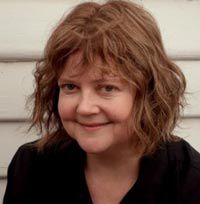Melbourne writer Jacinta Halloran talks about medicine, growing up Catholic and gentle reincarnations of belief in her second novel,

If a pilgrimage is a journey guided by a moral or spiritual imperative, what then is a pilgrimage undertaken by one who doesn’t believe? Jacinta Halloran’s new novel asks that question when Celeste, a paediatrician who has long ago abandoned her Catholic faith, sets out to accompany her sister and her terminally ill mother to Nicula, a Romanian town where the Virgin Mary has been reported to appear to locals and effect miracle cures.
Pilgrimage pits medical science against faith, a daughter’s beliefs against those of her mother, and follows the physical and emotional journey that will test both of them. Halloran’s first novel, Dissection, also examined the limits of medicine and the people who practise it. She says, ‘Medicine has a great deal to offer but when it comes to things that western medicine can’t offer hope for, what belief system do people then embrace? How do you find a sense of hope?’
For Celeste, turning towards religion for that hope is foolish and irrational. Despite her dogged determination to accompany her mother on the pilgrimage, she must constantly fight the urge to convince her of the pointlessness of the journey. Halloran herself works part-time as a GP and knows the power of the medical ethos.
‘I often wonder if I hadn’t done medicine how I would see the world. Medicine is almost like being sworn into a brotherhood in the way you think because you’re so young when you go to university. You don’t question what you’re given at that age, and medicine is taught as though it is all-knowing.’
That may be the case, but the doctrine of the Catholic Church leaves its own ineradicable traces. When it came to writing the scenes of Celeste’s youth in the Church, Halloran found ‘when you want to write about being brought up in the Catholic faith, you have a lot of vivid memories. As a child, you feel inculcated into the whole mystery of it – the wanting to be touched by the Holy Spirit and to be a good person. And then there’s the hypocrisy you see when you become a teenager. You see the pomp and ceremony, and on the other hand those people are actually living bad lives. It is hard to keep the faith.’
Despite this, Halloran writes her believers with sympathy and respect. In the contemporary secular world, priests have taken on the role of their old foe, the devil – presumed to be guilty of the worst kind of corruption. But Halloran’s priest, who was a powerful presence in Celeste’s childhood and who is there to counsel her mother when the illness is diagnosed, is gentle and kind, not the overbearing bogeyman she could blame for her mother’s determination to set out on this pilgrimage. There are no grand pronouncements from the Church here, only a suggestion that ‘It will be time for the three of you to spend together. Your mother wants this very much: this, in itself, is good enough reason to go. Don’t you think so?’
Beneath the questions of where one can place one’s trust and hope are the deeper currents that begin to surface as the trip progresses. Celeste’s pilgrimage is about far more than her mother’s illness. What seems at first to be a story of the world of Christian miracles measured against the tenets of western medicine soon opens a vein of family trauma and the residual bitterness and resentment born of distant injuries, real and imagined. Halloran brings a clinical eye to Celeste and yet, ‘You can feel sympathy with her once you know the whole story. There’s a quick-witted hardness about her but underneath it all she is full of love for her mother, for her husband.’
The bridge builder between mother and daughter in their uncomfortable and sometimes exasperated communication is Nathalie, Celeste’s younger sister who has failed to achieve almost all of Celeste’s benchmarks of maturity and self-reliance. Yet Nathalie’s willingness to give unconditional support to her mother’s journey brings an optimism and lightness to the story. Halloran says, ‘Nathalie was a relief in the writing for me. She’s open and loveable and lively. And I was happy that she could eventually take on responsibility.’ Through Nathalie’s eyes, it seems that no matter what the outcome of the pilgrimage, the trip itself is of value. She too has suffered disappointments, but she is more able to release them, to leave them by the side of the road, while Celeste begins the journey burdened by the weight of every wrong decision, every unfair blow of fate.
The first of the griefs hollowing out Celeste’s life is the death of her father when she was ten. Three years later her mother married the feckless drifter Lionel and, even after Nathalie was born, Celeste could not accept Lionel as anything except the usurper. As much as she adored her baby sister, she despised this useless stepfather who could barely hold on to a job. A few years later he vanished, taking the family’s savings with him, leaving both daughters with a terrible emptiness, a longing for what they had lost.
‘I had been writing the book for a while, and it was on a residency that it came to me – the absent father was something that could hold the book together. The disappearing father haunts people. The impending death of her mother became a catalyst for Celeste to go back to the past and remember the loss of her father.’
Underneath her character’s irritation and frustration, Halloran writes a profound sorrow in Celeste, a submerged, aching desire for something more than the satisfaction of her work healing children. Halloran masterfully reels Celeste’s deepest concerns to the surface in her interactions with her mother and sister, and particularly with their gallant and formal Romanian guide, Stefan, whose polite yet direct questions challenge Celeste’s firmly held beliefs. With sudden and sympathetic insight he also tears open her carefully papered-over grief at the other absence in her life: the child she is unable to conceive. While her rational mind knows this is not a matter of blame, she is still tormented by a suspicion that she is somehow at fault, and that she has failed her husband.
One of Halloran’s significant achievements in this book is the fine balance of a number of interwoven themes. At no point does the work feel stretched by its thematic complexity. Rather, the narrative is propelled inexorably and gracefully forwards by tributaries of doubt, guilt, loyalty and longing.
Working as a GP, Halloran spends her time ‘listening to what people are saying and trying to hear what’s behind it. There’s a huge amount of richness in what I do. People tell me things, and working out how those stories affect them and lead them to present with certain symptoms is fascinating. The sense of how they tell their story. When a stoic comes in complaining of pain, I take it very seriously.’ For Halloran the occupations of writer and doctor fit together perfectly. ‘Once you start to write it’s great for medicine. You have a better understanding of stories and the meaning behind them.’
Where Dissection was a reflective, sorrowful unravelling of a woman’s carefully constructed life and moral universe, Pilgrimage has the quality of a contemplative awakening, a passage from complacency through pain and darkness towards joy. Halloran speaks of Marilynne Robinson’s Home as an inspiration, and it is easy to see the gentle trajectory of Pilgrimage as a homage to Robinson’s grave and beautiful writing. The novel is testament to a restoration of belief – not in the potency of medicine and science, a faith Celeste has never lost, nor in religious miracles, but in the enduring and healing power of love.
Pilgrimage
A book by Booki.sh

.


